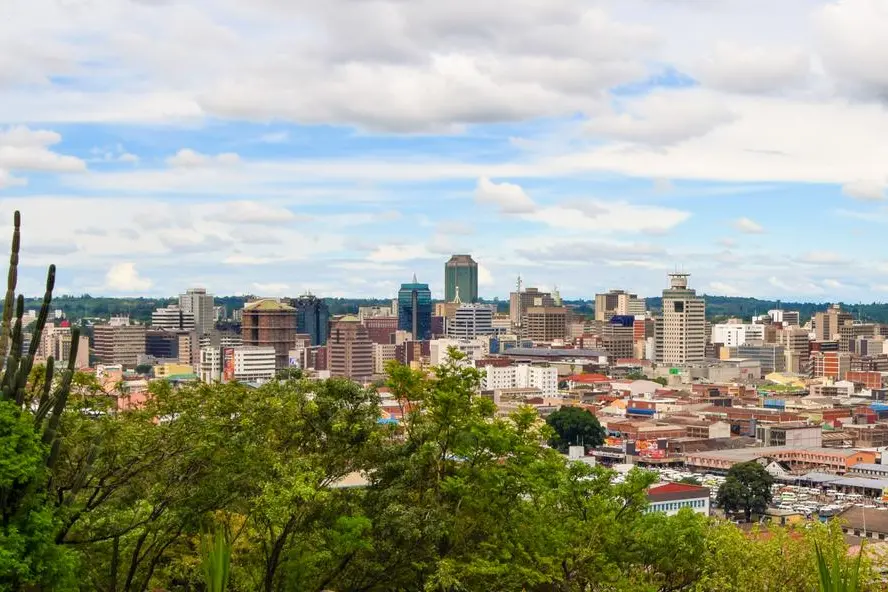PHOTO
The African Development Bank (AfaDB) says a new law introduced by Zimbabwe to curb civil society activities is a major setback to the southern African country’s push for urgent debt relief.
Zimbabwe owes foreign creditors $21 billion, with arrears making up a significant portion of the debt overhang and preventing the country from accessing low-cost loans from institutions like the World Bank and AfDB.
The country’s debilitating debt crisis took centre stage at a major event on the sidelines of the International Monetary Fund (IMF) and World Bank Spring Meetings in Washington this week.
AfDB president Akinwumi Adesina told the roundtable on Zimbabwe’s Arrears Clearance and Debt Resolution Process that the recently passed Private Voluntary Organisations (PVO) Act posed a threat to the debt resolution talks.“Zimbabwe has made a lot of progress, against all odds,” said Dr Adesina, before pointing that that the PVO law was “a significant setback and poses a risk to the arrears clearance and debt resolution process.”After the controversial bill was signed into law by President Emmerson Mnangagwa on April 11, the European Union (EU) immediately suspended its financial support for governance reforms that creditors had set as one of the key conditions for talks.
The EU said it was disappointed that Zimbabwe had failed to live up to its own commitments in the process, particularly on expanding civic space.
President Mnangagwa ignored advice from United Nations experts and local civil society groups to sign the new law that amended five major pieces of legislation and triggered sweeping changes to Zimbabwe’s regulatory framework for civic groups and NGOs.
It gives the authorities extensive powers to monitor and control the operations of voluntary organisations, including the ability to scrutinise their ownership structures, funding sources and affiliations.
Talks progressFormer Mozambican President Joachim Chissano, who is the facilitating the debt relief talks, said Zimbabwe needed to pay attention to civil society engagement, democratic elections, judicial processes, freedom of assembly and freedom of expression as part of the reforms needed for the debt talks to yield results.“These challenges show that dialogue is still needed for reforms to take root.“They also show that political reforms are not a linear process,” Mr Chissano said, adding that these challenges “should mobilise us to redouble our efforts and re-energise the dialogue process.”He, however, expressed optimism that the debt relief talks would bear fruit as he felt that the country had made some progress on the required reforms.“The parameters of the dialogue have been set,” Mr Chissano said. “Most issues have been dealt with. Commitments and targets have been agreed upon.“We should all be proud of the dialogue process and what it has achieved.”Zimbabwe was pushing for a $2.6 billion bridging loan to clear its arrears with international creditors as part of the debt relief talks.“The government of Zimbabwe has proposed a plan to secure bridge financing of $2.6 billion to clear arrears to international financial institutions,” the AfDB said after the roundtable in Washington.
The temporary loan would help Zimbabwe to pay off its overdue debts to international lenders, which could pave the way for the country to be allowed to access cheaper loans from global financial institutions.
Arrears clearanceDr Adesina said other crucial steps included exploration of additional resources from the African Development Fund and prioritisation of Zimbabwe’s arrears clearance within the G20 Common Framework.
He said the AfDB was mobilising resources for the country’s arrears clearance, which could materialise towards the end of this year.“Similarly, we encourage the World Bank’s International Development Association to do the same to clear arrears,” Dr Adesina said.“To move the arrears clearance and debt resolution forward, the African Development Bank Group is financing the global sovereign advisory and legal advisors, Kepler-Karst, to support the arrears clearance and debt resolution process with clear timelines.”Mr Chissano said Zimbabwe had undertaken to introduce reforms that will see its central bank ceasing quasi-fiscal operations, relaxing exchange rate controls and making token payments to creditors.
He said the payment of compensation to more than 4,000 white Zimbabweans who were dispossessed of their farms during a chaotic land reform two decades ago was also part of the process that needed be prioritised.
Read: Broke Zimbabwe to pay $3bn to white landowners whose farms State seizedIn November last year, Zimbabwe agreed to accelerate the arrears clearance and debt resolution process by working with the International Monetary Fund for a staff monitored programme (SMP) that was meant to start in January 2025.
The IMF programme falls under the economic reforms Zimbabwe is undertaking as part of the process to clear its $21 billion public debt and arrears. The EU, along with the United States, has been one of the biggest financiers of the process.
The US pulled out of the process last year following President Mnangagwa’s controversial re-election and demanded both economic and political reforms as part of its conditions for returning to the table.
The country’s biggest Paris Club creditors are Germany, France, the United Kingdom, Japan and the US with a combined external debt stock of $2.9 billion, representing 74 percent of the total Paris Club external debt.
Zimbabwe’s debt stock has risen in recent years as the country has sought cheap loans from China for infrastructure but has been unable to repay the money due to an unending economic crisis characterised by hyperinflation and currency instability.
© Copyright 2022 Nation Media Group. All Rights Reserved. Provided by SyndiGate Media Inc. (Syndigate.info).




















